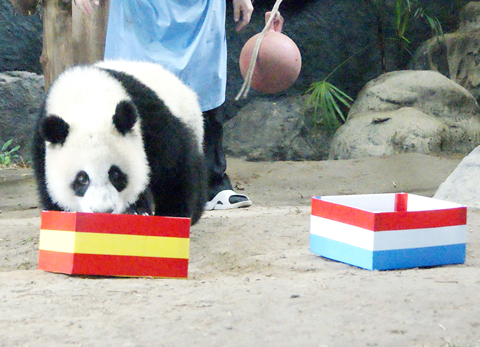Soccer fever swept Spain and the Netherlands yesterday as fans desperate to taste World Cup success for the first time painted the streets red and orange.
Euro 2008 champions Spain are favorites to lift the trophy for the first time in tonight’s clash at Johannesburg’s Soccer City stadium, but the Dutch, twice defeated finalists, are confident they can win.

PHOTO: REUTERS
Throughout the Netherlands entire streets are lined with orange flags and some homes have been covered with plastic sheets in the national color.

PHOTO: EPA
Flags prematurely declaring the Netherlands, ranked fourth in the world, this year’s soccer World Cup champions are selling like hot cakes. Sales of televisions, barbecue sets and orange accessories were expected to reach a peak yesterday, according to a spokeswoman for the Dutch retailers federation, Yvonne Fernhout.
In The Hague, animal protection services have urged people not to blow too hard on their vuvuzela horns during the match to avoid terrorizing their pets.
Dutch brewer Heineken said it had put production on hold across the country to allow workers to watch the match. Police are pleading with fans to behave long enough for them to watch the match, while Dutch airline KLM said it would keep its pilots updated on all the crucial moments of the match.
Giant television screens are being installed in several cities. The biggest gatherings of supporters today are expected in Amsterdam, where up to 50,000 watched the semi-final against Uruguay in the Museum Square and in Rotterdam.
Authorities are planning a boat parade in Amsterdam if the Dutch win, with 1 million people expected to turn out.
In Madrid, the players will be feted in a parade in an open-top bus even if their team, ranked second in the world, comes up short.
At least 150,000 fans of La Roja (the Reds) are expected to cram Madrid’s main Paseo de Castellana avenue this evening to witness Spain’s first-ever appearance in a World Cup final on giant screens in a “fan park.”
Municipal workers have draped flags over the Cibeles and Neptune fountains, where fans of Real Madrid and Atletico Madrid celebrate their victories.
Spain’s Mahou beer company has launched an Internet campaign for July 11 to be named a national holiday if Spain lift the World Cup, and the supermarket chain Carrefour is offering 25 percent reductions on television sets.
Even in Catalonia, a region with its own distinct culture and language and which has traditionally been disdainful of the Spanish national team, there was growing enthusiasm.
Authorities in the Catalan capital of Barcelona agreed for the first time during the tournament to set up a giant outdoor screen for the match.
However, the Spanish soccer fever rankles with some.
“We have ended up with more Spanish flags than senyeras [the yellow and red-striped Catalan flag] flying from balconies and all over the place,” an upset Catalan regional government chief, leftist separatist Josep Lluis Carod-Rovira, complained on his blog.
Center-right daily El Mundo picked up on the issue on Friday, saying that “Catalan nationalists are worried about the pull of the national side” on people in the region.
El Mundo, a vociferous opponent of Catalan nationalism, rejoiced in so many people “coming out of the cupboard” to support the Spanish — who include many players from Catalan giants Barcelona — as they prepare to take on the Dutch.
The paper said 74 percent of viewers in the region had watched the semi-final win over Germany — without speculating how many might actually have supported the Germans.
Catalans have in the past been reticent about backing the Spanish side. They have their own “national” selection, but it plays only friendly internationals.
One pundit predicting a win for the Spanish is the feted octopus Paul, who became a World Cup sensation by correctly predicting the outcome of all six of Germany’s World Cup games from his aquarium home in western Germany.
However, the Dutch are not too dismayed as Pauline, a female octopus in the Netherlands, forecast a win for the Netherlands, albeit in her first attempt at clairvoyancy.
Also See: 2010 FIFA WORLD CUP: PREVIEW: ‘Oranje,’ ‘Roja’ face off at Soccer City

People can preregister to receive their NT$10,000 (US$325) cash distributed from the central government on Nov. 5 after President William Lai (賴清德) yesterday signed the Special Budget for Strengthening Economic, Social and National Security Resilience, the Executive Yuan told a news conference last night. The special budget, passed by the Legislative Yuan on Friday last week with a cash handout budget of NT$236 billion, was officially submitted to the Executive Yuan and the Presidential Office yesterday afternoon. People can register through the official Web site at https://10000.gov.tw to have the funds deposited into their bank accounts, withdraw the funds at automated teller

PEACE AND STABILITY: Maintaining the cross-strait ‘status quo’ has long been the government’s position, the Ministry of Foreign Affairs said Taiwan is committed to maintaining the cross-strait “status quo” and seeks no escalation of tensions, the Ministry of Foreign Affairs (MOFA) said yesterday, rebutting a Time magazine opinion piece that described President William Lai (賴清德) as a “reckless leader.” The article, titled “The US Must Beware of Taiwan’s Reckless Leader,” was written by Lyle Goldstein, director of the Asia Program at the Washington-based Defense Priorities think tank. Goldstein wrote that Taiwan is “the world’s most dangerous flashpoint” amid ongoing conflicts in the Middle East and Russia’s invasion of Ukraine. He said that the situation in the Taiwan Strait has become less stable

FRESH LOOK: A committee would gather expert and public input on the themes and visual motifs that would appear on the notes, the central bank governor said The central bank has launched a comprehensive redesign of New Taiwan dollar banknotes to enhance anti-counterfeiting measures, improve accessibility and align the bills with global sustainability standards, Governor Yang Chin-long (楊金龍) told a meeting of the legislature’s Finance Committee yesterday. The overhaul would affect all five denominations — NT$100, NT$200, NT$500, NT$1,000 and NT$2,000 notes — but not coins, Yang said. It would be the first major update to the banknotes in 24 years, as the current series, introduced in 2001, has remained in circulation amid rapid advances in printing technology and security standards. “Updating the notes is essential to safeguard the integrity

REASSURANCE: The US said Taiwan’s interests would not be harmed during the talk and that it remains steadfast in its support for the nation, the foreign minister said US President Donald Trump on Friday said he would bring up Taiwan with Chinese President Xi Jinping (習近平) during a meeting on the sidelines of the APEC Summit in South Korea this week. “I will be talking about Taiwan [with Xi],” Trump told reporters before he departed for his trip to Asia, adding that he had “a lot of respect for Taiwan.” “We have a lot to talk about with President Xi, and he has a lot to talk about with us. I think we’ll have a good meeting,” Trump said. Taiwan has long been a contentious issue between the US and China.